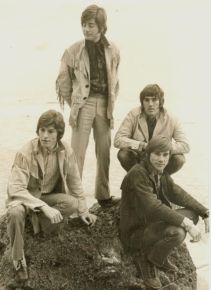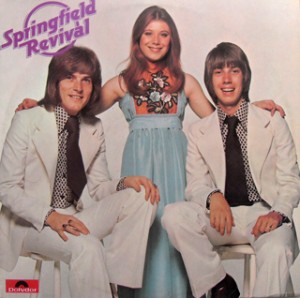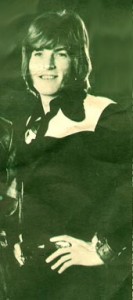Beginning as one of scores of ‘beat’ acts slogging it out on the Melbourne scene in the mid 60s, The Mixtures gradually gained national prominence over the next few years. In mid-1970 The Mixtures signed to a new Melbourne-based Fable imprint. Its owner, industry veteran Ron Tudor, had made his name as a producer and A&R manager for theW&G and Astor labels, and had discovered both Diana Trask and The Seekers and signed them to their first record contracts with W&G in the early Sixties.
Several acts including The Mixtures cut their own versions of proven British hits that were not being played in Australia because of the Radio Ban. During this time, Ron Tudor was being sent regular packages of new UK releases from London by his friend, former EMI house producer David McKay, and he optioned songs he thought would be suitable for his Fable acts. He had already scored a huge hit with the Liv Maessen version of Mary Hopkin’s “Knock, Knock, Who’s There?”, and when he offered The Mixtures “In The Summertime“, a song that had recently been a UK hit for Mungo Jerry. The band jumped at the chance to record it – although Idris Jones declined to sing on it, feeling it was too ‘poppy’ – so bassist Mick performed the lead vocal.
 Unhindered by any competition from the original, The Mixtures’ version (backed by (b/w “Where You Are”) shot to #1 in August that year, at the height of the Radio Ban, and it stayed in the charts for 23 weeks. Happily they were able to capitalise on this good fortune with the follow-up, a similarly breezy, honky-tonk-style original, “The Pushbike Song”, co-written by Idris Jones and his brother Evan. It was an even bigger success, providing them with back-to-back #1 singles, and charting for an impressive 25 weeks. Significantly, Fable was also able to arrange a distribution deal with Polydor in the UK, where “The Pushbike Song” leaped into the UK Top 5, making it the first record entirely written, performed and produced in Australia to become an international hit. “The Pushbike Song” reached #2 in England the start of 1971 and stayed in the UK Top 50 for 21 weeks. It was also released by Sire Records in the USA, where it reached a creditable #44 on theBillboard Top 100.
Unhindered by any competition from the original, The Mixtures’ version (backed by (b/w “Where You Are”) shot to #1 in August that year, at the height of the Radio Ban, and it stayed in the charts for 23 weeks. Happily they were able to capitalise on this good fortune with the follow-up, a similarly breezy, honky-tonk-style original, “The Pushbike Song”, co-written by Idris Jones and his brother Evan. It was an even bigger success, providing them with back-to-back #1 singles, and charting for an impressive 25 weeks. Significantly, Fable was also able to arrange a distribution deal with Polydor in the UK, where “The Pushbike Song” leaped into the UK Top 5, making it the first record entirely written, performed and produced in Australia to become an international hit. “The Pushbike Song” reached #2 in England the start of 1971 and stayed in the UK Top 50 for 21 weeks. It was also released by Sire Records in the USA, where it reached a creditable #44 on theBillboard Top 100.
Buoyed by the success of the singles, The Mixtures made the inevitable trip to England in January 1971.
After The Mixtures
 After leaving the band, Mick remained in the UK and formed a group called Springfield Revival, with Ray Martin and singer Donna Jones. As the name suggests, this group reworked the folk trio format of ‘The Springfields’ in much the same way that The New Seekers ‘revived’ the original Seekers. Flinn then became Jones’ manager-writer-producer and he and Donna scored two major hits under the stage name Pussyfoot, including the 1977 Australian #1 single “The Way That You Do It”. Donna Jones went on to join The New Seekers in 1980.
After leaving the band, Mick remained in the UK and formed a group called Springfield Revival, with Ray Martin and singer Donna Jones. As the name suggests, this group reworked the folk trio format of ‘The Springfields’ in much the same way that The New Seekers ‘revived’ the original Seekers. Flinn then became Jones’ manager-writer-producer and he and Donna scored two major hits under the stage name Pussyfoot, including the 1977 Australian #1 single “The Way That You Do It”. Donna Jones went on to join The New Seekers in 1980.

Mick formed the Mick Flinn Band in 1978 and continued to write and produce for other artists, scoring a UK Top 10 hit in December 1984 with the song “Do The Conga”, which he co-wrote with Peter Morris and which was recorded by Black Lace. Mick also joined The New Seekers in 1981 and then in 2002, he replaced Marty Kristian as front man with the group. Although the connections between The Mixtures and The New Seekers went back to the early Seventies — both groups shared the same management at that time. Mick had also collaborated with New Seeker Paul Layton on the song “Me and My Guitar”, which appeared on the B-side of one of their singles and on the 1973 album Peter, Paul & Marty, which featured the three male singers from the New Seekers, including Aussie vocalist Peter Doyle. More recently Mick has revived The Mixtures’ name with Fred Weiland for club dates in the UK.
Mick is still a member of The New Seekers today, and in 2009 the group had a successful Album in the UK charts going straight in at No 17. The Album was entitled “It’s Been too long The Greatest Hits and More”, the more part being a selection of brand new tracks written by Mick Flinn and Paul Layton and the title track “It’s been too long” was written by Mick and his old friend and very successful song writer Steve Kipner.

